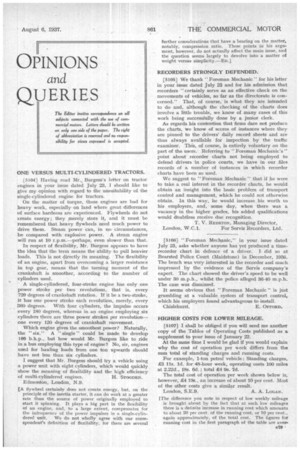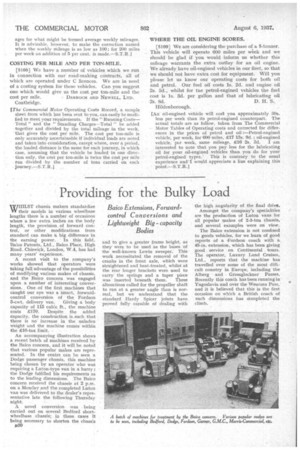OPINIONS
Page 35

Page 36

If you've noticed an error in this article please click here to report it so we can fix it.
and
QUERIES
ONE VERSUS MULTI-CYLINDERED TRACTORS.
[5104] Raving read Mr. Burgess's letter on tractor engines in your issue dated July 23, I should like to give my opinion with regard to the unsuitability of the single-cylindered engine for tractors.
On the matter of torque, these engines are bad for heavy work, especially. on land where great differences of surface hardness are experiented. Flywheels do not create energy; they merely store it, and it must be remembered that heavy flywheels need much power to drive them. Steam power can, in no circumstances, be compared with explosive power. A steam engine will run at 10 r.pan.—perhaps, even slower than that.
In respect of flexibility, Mr. Burgess appears to have the idea that the term means the ability to pull heavier loads. This is not directly its meaning. The flexibility of an engine, apart from overcoming a larger resistance in top gear, means that the turning moment of the crankshaft is smoother, according to the number of cylinders used.
A single-cylindered, four-stroke engine has only one power stroke per two revolutions, that is, every 720 degrees of crankshaft rotation. If it be a two-stroke, it has one power stroke each revolution, merely, every 360 degrees. With four cylinders, the impulse occurs every 180 degrees, whereas in. an engine employing six cylinders there are three power strokes per revolution-one every 120 degrees of crankshaft movement.
Which engine gives the smoothest power? Naturally, the "six." A "single" could be made to develop 100 b.h.p., but how would Mr. Burgess like to ride in a bus employing this type of engine? No, sir, engines used for hauling loads from one ton upwards should have not less than six cylinders.
I suggest that Mr. Burgess should try a vehicle using a power unit with eight cylinders, which would quickly show the meaning of flexibility and the high efficiency
of multi-cylindered engines. H. STOGDEN. " Edmonton, London, N.D.
[A flywheel certainly does not create energy, but, on the principle of the inertia starter, it can do work at a greater rate than the source of power originally employed to start it spinning. It plays a big part in the flexibility of an engine, and, to a large extent, compensates for the infrequency of the power impulses in a single-cyliudered unit. We do not wholly agree with our correspondent's definition of flexibility, for there are several further considerations that have a bearing on the matter, notably, compression ratio. These points in his argument, however, do not actually affect the main issue, and the question seems largely to devolve into a matter of weight versus simplicity.—En.j RECORDERS STRONGLY DEFENDED.
[5105] We thank "Foreman Mechanic" for his letter in your issue dated July 23 and for his admission that recorders "certainly serve as an effective check on the movements of vehicles, so far as the directorate is concerned." That, of course, is what they are intended to do and, although the checking of the charts does involve a little trouble, we know of many cases of this work being successfully done by a junior clerk.
As regards his contention that films dare not produce the charts, we know of scores of instances where they are pinned to the drivers' daily record sheets and are thus always available for inspection by the traffic examiner. This, of course, is entirely voluntary on the part of the users. Referring to "Foreman Mechanic's" point about recorder charts not being employed to defend drivers in police courts, we have in • our files records of a number of instances in which recorder charts have been so used.
We suggest to "Foreman Mechanic" that if he were to take a real interest in the recorder charts, he would obtain an insight into the basic problem of transport control and management, which he could not otherwise obtain. In this way, he would increase his worth to his employers, and, some day, when there was a vacancy in the higher grades, his added qualifications would doubtless receive due recognition.
T. V. REDSTON, Managing Director, London, W.C.1. For Servis Recorders, Ltd.
[5106] "Foreman Mechanic," in your issue dated July 23, asks whether anyone has yet produced a timerecorder chart in defence of a driver. I did so at Bearsted Police Court (Maidstone) in December, 1936. The bench was very interested in the recorder and much impressed by the evidence of the Servis company's expert. The chart showed the driver's speed to be well under 30 m.p.h., whilst the police alleged 36-40 m.p.h. The case was dismissed.
It seems obvious that "Foreman Mechanic" is just grumbling at a valuable system of transport control, which his employers found advantageous to install.
Claislehurst. E. OFFORD.
HIGHER COSTS FOR LOWER MILEAGE.
[5107] I shall be obliged if you will send me another copy of the Tables of Operating Costs published as a supplement to your issue of January 22.
At the same time I would be glad if you would explain why the cost of operation per week differs from the sum total of standing charges and running costs.
For example, 1-ton petrol vehicle: Standing charges, M 11s. 1d. for 48-hour week, operating costs 100 miles at 2.22d., 18s. 6d. ; total £4 9s. 7d.
The total cost of operation per week shown below is, however, £4 19s., an increase of about 10 per cent. Most of the other costs give a similar result.
London, S.E.9. A. A. LOGAN.
[The difference you note in respect of low weekly mileage is brought about by the fact that at such low mileages there is a definite increase in running cost which amounts to about 20 per cent, of the running cost, or 10 per cent, again approximately, of the total cost. The figures for running cost in the first paragraph of the table are aver'
ages for what might be termed average weekly mileages. It is advisable, however, to make the correction named when the weekly mileage is as low as 100; for 200 miles per week an addition of 5 per cent. is made.—S.T.R.1 COSTING PER MILE AND PER TON-MILE.
[5108] We have a number of vehicles which we run in connection with our road-making contracts, all of which are operated under C licences. We are in need of a costing system for these vehicles. Can you suggest One which would give us the cost per ton-mile and the
cost per mile. • DARROCH AND NEWELL, LTD. Coatbridge.
[The Commercial Motor Operating Costs Record, a sample sheet from which has been sent to you, can easily be modified to meet your requirements. If the "Running Costs— Total" and the "Standing Charges'--Total" be added together and divided by the total mileage in the week, 'that gives the cost per mile. The cost per ton-mile is only accurately ascertainable if individual loads are noted • and taken into consideration, except where, over a period, the loaded distance is the same for each journey, in which case, assuming that the vehicle be loaded. in one direction only, the cost per. ton-mile is twice the cost per mile run divided by •the .number of tons carried on each . journey.--S.T.R.1 WHERE THE OIL ENGINE SCORES.
[5109] We are considering the purchase of a 5-tonner. This vehicle will operate 600 miles per week and we should be glad if you would inform us whether this mileage warrants the extra outlay for an oil engine. We already have oil-engined vehicles in our fleet, so that we should not have extra cost for equipment. Will you please let us know our operating costs for both oil and petrol. Our fuel oil costs is. 2d. and engine oil 2s. 5d., whilst for the petrol-engined vehicles the fuel cost is is. 3d. per gallon and that of lubricating oil .2s. 8d. D. H. S.
Hildenborough. • rAn oil-engined vehicle will cosl you approximately 30s. less per week than its petrol-engined counterpart. The actual totals are as follow, taken from The Commercial Motor Tables of Operating costs and corrected for differences in the prices of petrol and oil :—Petrol-engined vehicle, per week, for 600 miles, £17 13s. 9d. ; oil-engined vehicle; par week, same mileage, £16 2s. 3d. I am interested to note that you pay less for the lubricating oil for your oil-engined vehicles than you do for your petrol-engined types. This is contrary to the usual experience ancl`I would appreciate a line explaining this point.—S.T.R.]












































































